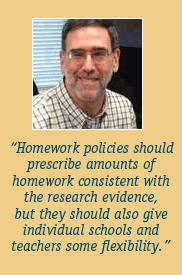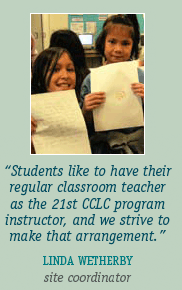 |
|
 |

Engaging Students in Homework Most of us have heard Benjamin Franklin’s saying that nothing is certain but death and taxes. Share this with a student in the United States, and he or she might add homework to the list. It is no surprise, then, that homework help has become an important part of afterschool programs. In fact, 90% of 21st Century Community Learning Centers reported offering tutoring and homework help in the 2004–2005 school year.1 Afterschool professionals can help students set and meet homework goals and keep parents and day-school teachers informed about students’ progress. Begin by letting day-school teachers know that homework help is available in your afterschool program, and stay informed about teachers’ homework expectations and students’ progress. For students who work better in a structured environment, a homework agreement signed by students, parents, teachers, and staff can describe each person’s role in homework and what is expected during homework time. Students can use a homework log to record assignments, track progress, and communicate with teachers and parents. A homework log can also be used to help students manage their time, prioritize the things they need to do, and assess their own progress. These and other resources are part of the National Partnership’s Afterschool Training Toolkit for Homework. To find the homework agreement and homework log, go to the Monitoring and Communicating about Student Progress section and look at the bottom of the page. 1 Naftzger, N., Kaufman, S., Margolin, J. & Ali, A. (2006). 21st Century Community Learning Centers (21st CCLC) analytic support for evaluation and program monitoring: An overview of the 21st CCLC Program: 2004–05. Naperville, IL: Learning Point Associates. Does Homework Improve Academic Achievement? If So,
How Much is Best? A recent poll conducted for the Associated Press found that about 57% of parents felt their child was assigned about the right amount of homework. Another 23% thought it was too little, and 19% thought it was too much. Educators should be thrilled with these numbers. Pleasing a majority of parents regarding homework and having equal numbers of dissenters shouting “Too much!” and “Too little!” is about as good as they can hope for. What the Research Says But opinions cannot tell us whether homework works; only research can. My colleagues and I have conducted a combined analysis of dozens of homework studies to examine whether homework is beneficial and what amount of homework is appropriate for our children. Harris Cooper, is a professor of psychology and neuroscience at Duke University, where he also directs the Program in Education, and author of The Battle over Homework: Common Ground for Administrators, Teachers, and Parents (Corwin Press). He is also a member of the National Partnership for Quality Afterschool Learning’s steering committee. |
|
 |
|
Partner WGBH Wins CINE Award for Toolkit Videos Held annually since 1957, CINE’s Golden Eagle Film and Video Awards recognize excellence in documentary and informational film and video production. Past recipients of CINE Golden Eagles include Steven Spielberg, George Lucas, Barbara Kopple, Ken Burns, and many others distinguished for their work with film and video. The three winning videos were “Rehearsing the Tempest,” “Integrating Science Across the Curriculum,” and “Investigating Science Through Inquiry.” Cynthia McKeown, video producer at WGBH, worked with associate producer Jayne Sportelli, editors Karen Silverstein and Mary-Kate Shea, and executive producer Amy Tonkonogy to create all the videos for the site. McKeown says, “It is an honor to be recognized by CINE with a Golden Eagle Award, and it is also very gratifying to know that the Partnership’s important work in promoting promising practices in afterschool is being honored as well.” |

Russian Jack 21st Century Community Learning Center
|
 |
 |
 |
||||||||
The Three Ms of Homework Help Do you have a training tip you would like to share? E-mail us at afterwords@sedl.org with “training tip” in the subject line. |
|
|||||||||
Questions or comments should be directed to: Laura Shankland |
This newsletter was produced in whole or in part with funds from the U.S. Department of Education under contract number ED-01-CO-0057/0001. You are welcome to reproduce issues of AfterWords and distribute copies at no cost to recipients. Please credit SEDL as publisher. Link to PDF versions of AfterWords is available here. For additional uses, please fill out and submit a copyright request form. Copyright © 2008 by SEDL. |






